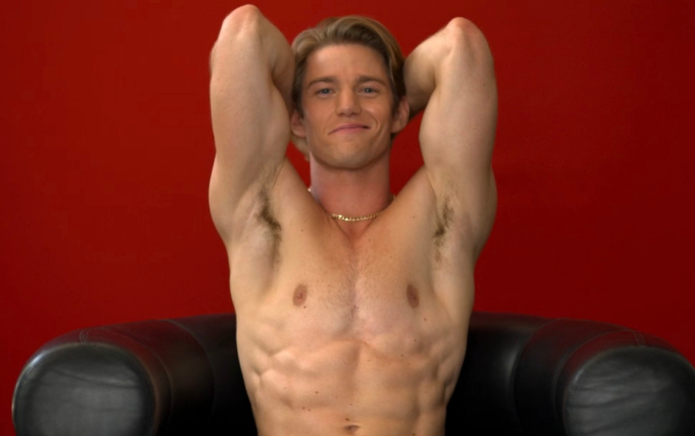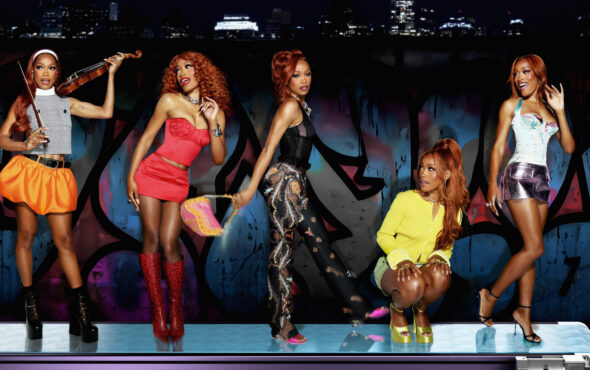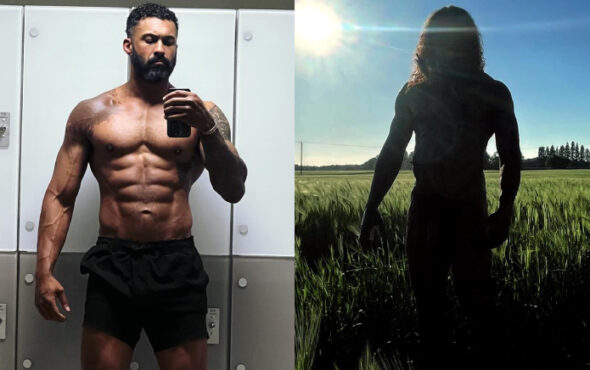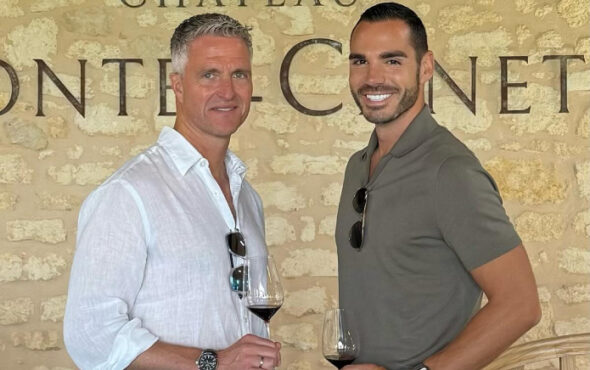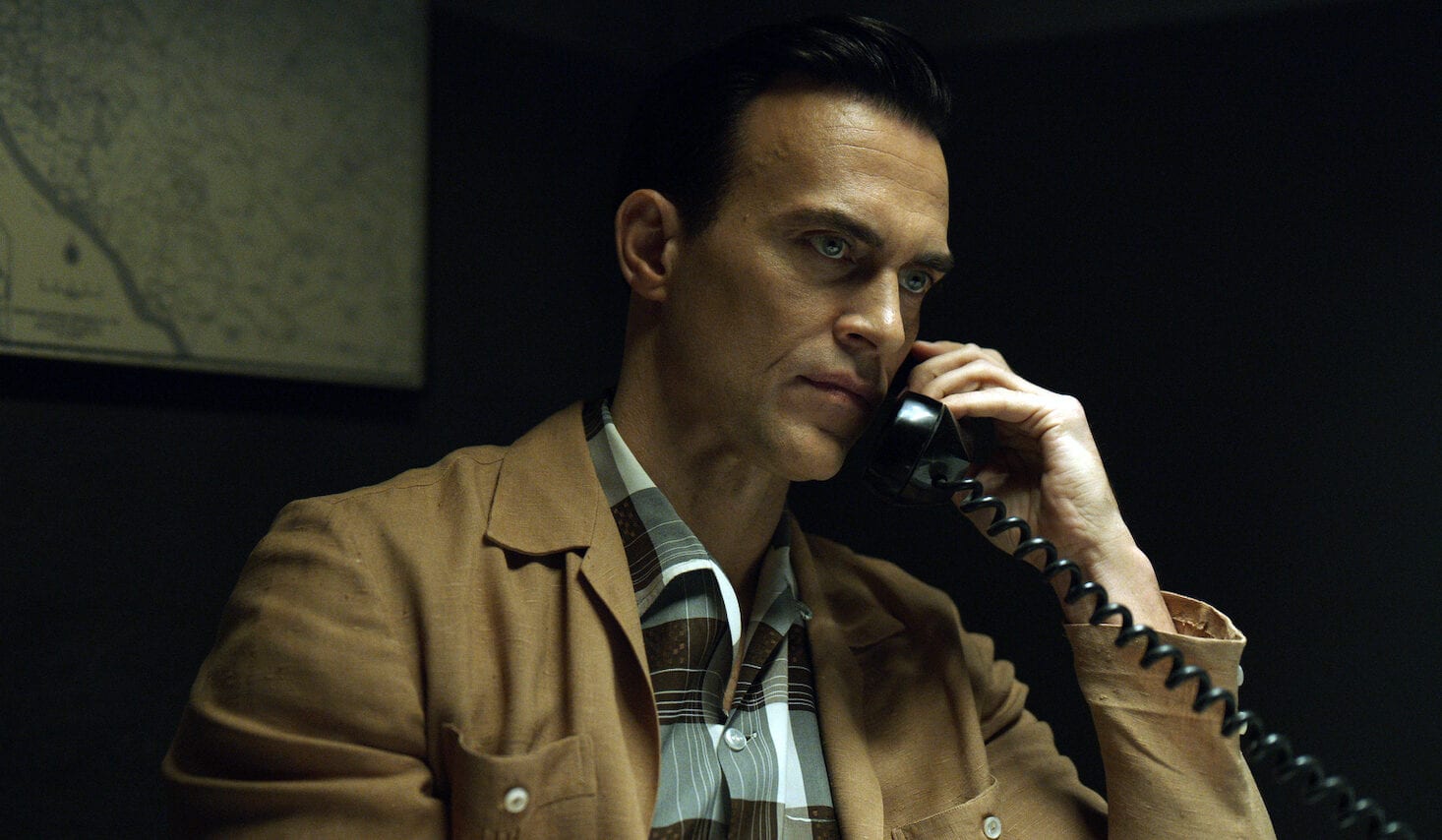
“We take so much for granted, even in the place of privilege in which I sit as a white, cis gay man,” says Cheyenne Jackson. “It’s important to always to remember our history, especially for the younger generation of queer people.” We’re chatting with the American Horror Story alum over Zoom, just a few days before the premiere of Equal on HBO Max. The four-part docuseries, which is now available to stream, chronicles landmark events and leaders in LGBTQ+ history and is notable for its all-queer ensemble.
In part one, Jackson steps into the role of playwright and author Dale Jennings, who was one of the founding members of The Mattachine Society – one of the earliest gay rights groups in the United States. In 1952, Jennings became one of the first homosexual men to contest sexual assault charges after allegedly soliciting a police officer in Westlake Park, now known as MacArthur Park. His acquittal is widely credited with increasing the awareness of the Gay Rights Movement.
“I want people to know his story, and know what he did with The Mattachine Society and ONE magazine. Even nowadays, as we’re on the precipice of this historic election, people are still wary and scared to put themselves out there politically or even say who they’re voting for on social media,” continues Jackson. “I think what I’d like people to take away from this is: look at this man’s bravery. That was seventy years ago – remember that and honour that. Let’s embody some of that in our own lives.”
Here, we speak with the star about his role in HBO Max’s groundbreaking new series and the importance of knowing our LGBTQ+ history. Jackson also goes into detail about his upcoming projects, which includes a starring role alongside Mayim Bialik in Fox sitcom Call Me Kat, as well as a recurring arc in the Saved By The Bell reboot. American Horror Story fans: brace yourselves for the end.
How did you get involved with Equal?
In a funny way, actually. I was doing a movie up in the Catskill Mountains last winter and it was snowy. We were in cabins and one of my co-stars was reading through an audition. I said, ‘What is that?’ He’s like, ‘Oh, it’s this new thing on HBO Max. Greg Berlanti is doing it and Jim Parsons.’ I was like, ‘Why didn’t I get that? I want to be in that.’ He was so sweet, ‘Well, here’s the info, you should tell your agent.’ I called him up and said, ‘So, what is this thing? I love the idea of the project.’ I had my reservations, but I loved that it was going to be a project highlighting people from our queer history, whose names we didn’t necessarily know. Here’s me, who knows my gay history pretty well. I thought that I kind of had it covered, and I didn’t. There are so many people. I didn’t know Dale Jennings, who I was going to be playing. I’d heard of Harry Hay and I had heard of The Mattachine Society, but there was a lot that I wanted to dive into. I was wary, only because I heard it was going to be mostly voiceover, and reenactments can go very wrong. We’ve all seen reenactments in television shows, where it kind of takes you out of it and they’re cheesy, but it was explained to me that it would be done very dreamlike, almost like a poem, and there would be lots of projections spliced with great archival footage. The scenes themselves would be more montage, maybe flashes from important parts of the story. That would all be kind of woven together in editing. I talked to the director of photography, she had some great ideas. So I said, ‘Great, let’s do it.’
What kind of research did you do to step into the role of Dale Jennings?
They provided me with a lot of information, so I read as much as I could. There were a lot of transcripts and I got my hands on a great recording of him. It was much later in his life, but it’s really interesting to hear. I just love the way people spoke in the 50s. My favourite part of Equal, in all four of them, is the archival footage, because I feel like you can’t really replicate that. I love seeing footage from 1953, gay guys sitting around kiki-ing in the privacy of their homes. The way they’re sitting, the way they’re talking to or touching each other, it’s the same, and it shows how far we’ve come, but also how far we still have to go. I read everything I could read.
A lot of people, including LGBTQ+ people, think that LGBTQ+ rights started with Stonewall. Why do you think that is?
Because of a lack of education. This is something we’ve been told for as long as I can remember. The first thing I ever heard about how the queer movement started was when I was 19, which was about the death of Judy Garland. Then some queens threw some rocks, and then Stonewall and then poof, here we are. Obviously there’s more to it, maybe that was true for somebody, but I think it’s just because we don’t focus on it. For example, RuPaul’s Drag Race. My favourite show, I love it. I’ve been on it a bunch and I will continue to be on it. I love Ru. I love them all. He is doing such a service by showing queer history; the lexicon, the words, bringing Paris Is Burning to a new generation. However, many young people, that’s as far as their knowledge goes. There’s more to queer culture than RuPaul’s Drag Race. I say that with all the love and affection I can muster. I think it behoves all of us to know the stories, because here I am sitting in a house, my house that I bought with my husband in the other room, and my kids in the other room, a life that I never thought I could ever have. That is because of all of these folks that have made sacrifices incrementally along the way. I wanted to honour the pain and the sacrifice that these people went through. It’s just unfathomable. We take so much for granted, even in the place of privilege in which I sit as a white, cis gay man. It’s important to always to remember our history, especially for the younger generation of queer people.
What do you want people to learn about Dale Jennings through Equal?
I want people to know his story, and know what he did with The Mattachine Society and ONE magazine. Even nowadays, as we’re on the precipice of this historic election, people are still wary and scared to put themselves out there politically or even say who they’re voting for on social media. Everybody’s afraid of being politically correct or hurting feelings. I think what I’d like people to take away from this is: look at this man’s bravery. Look at this person who had everything to lose in 1953, yet he still stood on the steps of the courthouse and made this proclamation. I think he was the first person ever on record to say, ‘I am a homosexual and I am unashamed.’ That’s power. That was seventy years ago – remember that and honour that. Let’s embody some of that in our own lives.
You’re in a new comedy series called Call Me Kat. The cast is stacked, and you’re reunited with your American Horror Story co-star Leslie Jordan. What can you tell me about the show?
Honestly, I almost get emotional talking about it, because this is the embodiment of so many years of just putting it out there. This is something that I’ve wanted to do for so long. I’ve wanted to do a multi-cam that is well written, has incredible comedians that isn’t cheesy, is relatable and sad, is about connection and loss, but is still really funny. It’s based on Miranda. I’m such a fan of that show. I love the whole construct of breaking the fourth wall. Miranda [Hart] is such a delicious, unicorn person that you just can’t find anywhere else. Honestly, if I were to think of anybody who could embody that in their own special way, but still with the imagination and the heart, it would be Mayim Bialik. People are going to lose their shit. She is so spectacular in this role. She’s got all the colours in the grand box and she gives you pratfalls and she gives you heartbreak at the drop of a hat, all while looking right into the camera. It’s a joy to be working in the middle of a global pandemic. It’s wonderful to be working and providing for my family, and to be creating art during this time when so many of my friends and colleagues are suffering or waiting for their next job, or waiting for their job that was cancelled to possibly be picked up again. Julian Gant is a young new actor who has a big improvisational background. Leslie Jordan is having quite the moment. He is living it up and he is my big sis. He’s just so wonderful and Kyla Pratt? Incredible comedian.
How far along is production?
We’re done with the first episode and we have episode two next week. Then we’re just going to start banging them out. It’s going a little slower because of COVID. My family’s been in strict lockdown since March and that’s what I needed to do for us, as grandma lives with us here. I have four-year-old twins. I am of the mindset that I’m wanting to listen to the scientists, and I want to protect my family. But we’re chugging along and the scripts are so funny. Darlene Hunt, she’s the writer, and it’s so good.
What can you tell me about your character, Max?
His name is Max Kingbird. He and Kat went to college together. They were in the same dorm and in the same group of friends, but never romantically hooked up. They definitely enjoyed each other’s company and they definitely love to cut loose. She makes Max laugh like nobody else. Max is somebody who he is not impressed with artifice, he sees people for who they truly are. He is kind, straightforward and he’s a bit of a dreamer. He’s come back to his hometown because he’s broken up with his French girlfriend, and he’s working at a bar, about to turn 40. It just so happens that Kat has a cat café right next door, and they come back into each other’s lives. He didn’t realise how much he missed her until he saw her again, and hilarity ensues. It’s really, really fun and they have us doing some incredible physical comedy.
I was surprised to see that you’re part of the Saved By The Bell cast too – what can we expect from your character?
I’m only in three episodes and I am Elizabeth Berkeley’s husband. It is a very polarising character. I know that people will have strong feelings about him. I love Elizabeth and I was a big fan of Showgirls when it came out. It’s rare to meet somebody who has gone through everything that she’s gone through, who is still open-hearted and truly lovely, and not cynical. She’s really funny in this and they pay homage to the original cheesy bit. Tracey Wigfield, who created it, she was one of the producers on 30 Rock, so it’s very fast.
I can’t let you go, obviously, without talking about American Horror Story. We’ve not seen you on the show since Apocalypse… Do you have any plans to return to the series?
There are no plans as of now. But once you’re part of Ryan Murphy’s world, and you are in that motley crew actors that he goes to, I wouldn’t be surprised if I pop up on something or another. Ryan has been incredible to me over the years. I first met him after Xanadu years ago. American Horror Story was such a such a mind trip. It was bloody, sexy, scary and totally outside of my comfort zone! I’m so grateful for it. I’m sure at some point, if he asks me to come back and do something, that would be great. But it was time for me, after four years and having kids, I made a conscious choice to kind of lighten it up a little bit for myself. I’m very empathetic and I’m very sensitive. I just needed a minute to be with my kids and do something a little lighter. I asked him if I could do a comedy and even though I had time left on my contract, he said absolutely. He definitely respected that and let me do that.
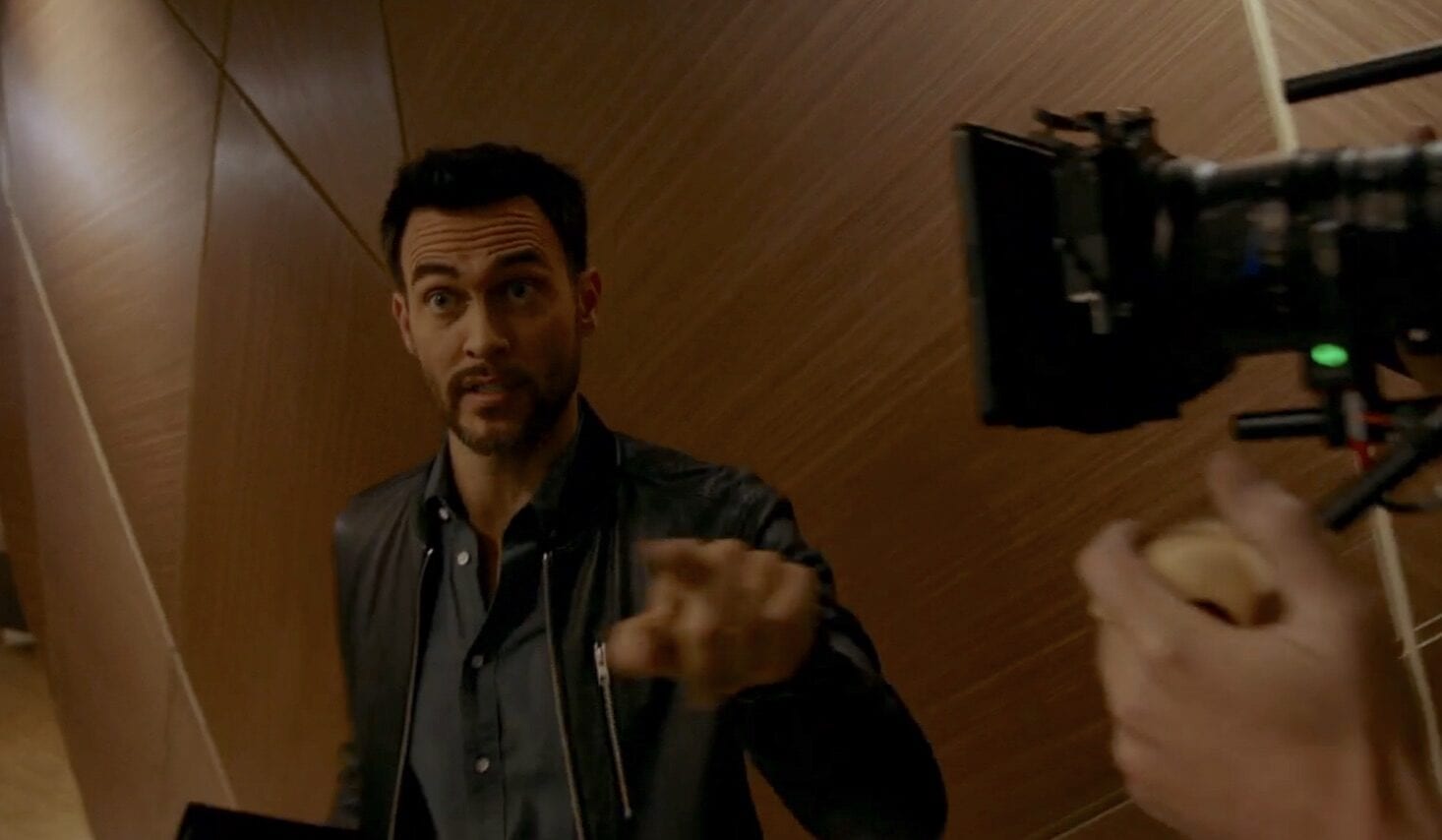
So is horror not your favourite genre?
I do like scary movies and scary stuff. My babies were born and I was taking a lot of the emotional side of the horror stuff home with me. I just needed a little bit of a change. I was shooting a horror movie last December, so I still love the genre. I just needed a little pause. Some people are made for it and in between takes, they can just turn it off. I can’t. It kind of sits with me and sits on me. Maybe I’m just not as good of an actor, I can’t just like brush it off so fast.
What’s been the hardest season for you to film?
Cult was the most the most emotional, the darkest, because it felt the most real. It really spoke to everything we were going through as a country, as a nation, as people. Some imagery and stuff in it was tough to shoot and tough to be a part of. But you know, it was done in such an artistic and entertaining way.
It’s the only season, so far, to not have a supernatural element.
There’s nothing scarier than people. When it’s imminent, when it’s not a vampire or the boogeyman or a ghost, but it’s actually just a person that hates you.
I rewatched Cult recently, and – SPOILER ALERT – I completely forgot about your death.
Yeah, but one good thing about the season is when my character’s brother chops my finger off, they gave me that fake finger. I love to bring little things home and the finger is sitting on my shelf with all my memorabilia! My son loves it. He’s like, ‘Can I play with the finger?’ So, there is a lightness to it. They’ve seen pictures of me in all states of dying and blood and they know it’s just part of make-believe and what daddy does for a living.
What’s been your favourite character to play?
Sidney from Roanoke. That was the most unhinged that I got to be. Apocalypse was very fun, but in Hotel and Cult I had to be very reserved. I had to be more steady. Whereas in Roanoke, I got to be this insane reality show producer who would stop at nothing to get the shot. It was very fast and I could look directly in camera. Angela Bassett directed my big episode and that was really fun. I got an incredible interrogation scene across with Kathy Bates, which is just an actor’s dream, because she’s the best of the best. That’s not everybody’s favourite season, but I think it’s underrated. It was pretty wild.
American Horror Story fans are really passionate about the seasons. I did a ranking of all nine, and I had a very unpopular reaction because Roanoke was placed quite high.
They take their lists very seriously! Sarah [Paulson] told me that going in. I knew Sarah from New York years before, and she was like, ‘Just know, the fans of Horror Story are no joke. They take it very personally, and that’s why we love them.’ I was definitely warned.
Have you personally experienced that side of American Horror Story fans?
The first kind of Comic Con type things that we did, I’d never experienced that kind of passion for a project. I relate to that so much; feeling like an outsider, feeling different, feeling like a weirdo, feeling other. That’s what that show really taps into, is all the people that maybe feel displaced and feel they definitely have a darker side. There’s a community.
What horror trope would you like to see explored in a future season of American Horror Story?
There was one year where it was pitched to me that it was going to be set during the American Civil War. Matt Bomer, me and Finn Wittrock were going to be brothers, which is funny, because there’s that meme of us where people think we all look exactly the same. Ryan said, ‘Yeah, it’s gonna be it’s gonna be a Civil War thing.’ He pitched it to us and that’s what we were all gearing up for. Then, it turned into something totally different. Remember that Nicole Kidman movie, The Others? Remember how the whole thing felt kind of dreamlike and foggy? And then there’d be like a Civil War? I just think there could be some cool stuff in that which might be kind of interesting. But nothing I could think of will ever be as cool as what Ryan does. So, I just wait, I just wait for the call.
Equal is now available to stream on HBO Max.
